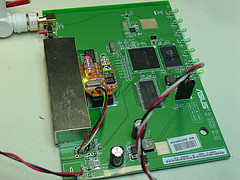Consumer Electronics Linux Initiative Starts

Many people use Linux every day and never know it. Indeed, they're often using Linux without even knowing they're using a computing device. For years now, Linux has been the operating system of choice for Digital Video Recorders (DVR)s, DVD players, Smart TVs, Wi-Fi access points, GPS devices, and on and on. But, there's never been a Linux kernel just for consumer electronics... until now.
At LinuxCon Europe in Prague, Czech Republic, The Linux Foundation, the non-profit organization dedicated to promoting Linux, announced that it was hosting a new project created by its Consumer Electronics (CE) workgroup: the Long Term Support Initiative (LTSI).
According to the Foundation, "The new project ... provides for both an annual release of a Linux kernel suitable for supporting the lifespan of consumer electronics products and regular updates of those releases for two years." LTSI has the backing of Hitachi, LG Electronics, NEC, Panasonic, Renesas, Samsung, Sony and Toshiba. In other words, this is a concrete plan with real and broad industry support.
LTSI will provide a common Linux base for use in a variety of consumer electronics products. Its purpose is to create and maintain a long-term industry tree, which will be stable for the typical lifetime--two to three years--of a consumer electronics product.
According to the Linux Foundation, "The LTSI tree is expected to be the usable base for the majority of embedded systems, as well as the base for ecosystem players (e.g., semiconductor vendors, set-vendors, software component vendors, distributors, and system/application framework providers). The LTSI project will combine the innovative features in newer kernels needed by CE vendors with a stable kernel, while helping those vendors get their code upstream to benefit the entire Linux community. The goal is to reduce the number of private trees currently in use in the CE industry and encourage more collaboration and sharing of development resources."
The Foundation states that this, "This new initiative is crucial because device makers are doing significant back-porting, bug testing and driver development on their own, which carries substantial cost in terms of time-to-market, as well as development and engineering effort to maintain those custom kernels. Through collaboration in this initiative, these CE vendors will reduce the duplication of effort currently prevalent in the consumer electronics industry."
LTSI should work hand-in-glove with another Linux Foundation-sponsored developers' initiative: The Yocto Project. This is an n open source collaboration project that provides templates, tools and methods to help programmers create custom Linux-based systems for embedded products regardless of the hardware architecture.
The LTSI project will also be encouraging companies to share their device code in the broader Linux kernel. Greg Kroah-Hartman, a leading Linux kernel developer and SUSE software engineer, said "I am very happy to be working with the LTSI group to help them get their device specific code into the mainline kernel.org tree through this initiative."
"The CE industry has leveraged Linux to reduce costs and speed time to market. Now they are taking the next step to reduce the costly duplication of effort at work maintaining custom kernels," said Jim Zemlin, executive director at The Linux Foundation in a statement. "LTSI is an important effort because it will allow vendors to share the work of maintaining a common kernel for the consumer electronics industry, resulting in more use of Linux in the industry and increasing contributions from CE makers to the advancement of Linux."
With so many smart CE devices already based on Linux, I expect the immediate effect will be to enable developers and their companies to speed up and improve product development since they won't need to waste time on maintaining their own Linux kernels. At the same time, I hope this well reduce the cost of these devices for customers. Anyway you look at it, LTSI should be a major win for vendors, programmers and end-users.
Related Stores:
Linus Torvalds on Android, the Linux fork
Top Five Linux Contributor: Microsoft
Linux device image by mightyohm, , CC 2.0.
